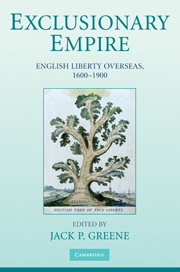Book contents
- Frontmatter
- Contents
- Notes on Contributors
- Preface
- Introduction
- 1 The Languages of Liberty in British North America, 1607–1776
- 2 Liberty and Slavery
- 3 “Era of Liberty”
- 4 Liberty and Modernity
- 5 Federalism, Democracy, and Liberty in the New American Nation
- 6 Liberty, Order, and Pluralism
- 7 Contested Despotism
- 8 “… a bastard offspring of tyranny under the guise of liberty”
- 9 How Much Did Institutions Matter?
- 10 The Expansion of British Liberties
- Index
1 - The Languages of Liberty in British North America, 1607–1776
Published online by Cambridge University Press: 05 June 2012
- Frontmatter
- Contents
- Notes on Contributors
- Preface
- Introduction
- 1 The Languages of Liberty in British North America, 1607–1776
- 2 Liberty and Slavery
- 3 “Era of Liberty”
- 4 Liberty and Modernity
- 5 Federalism, Democracy, and Liberty in the New American Nation
- 6 Liberty, Order, and Pluralism
- 7 Contested Despotism
- 8 “… a bastard offspring of tyranny under the guise of liberty”
- 9 How Much Did Institutions Matter?
- 10 The Expansion of British Liberties
- Index
Summary
In the seventeenth century, beginning with the settlement of Jamestown, Virginia, in 1607, English subjects of middling and poor circumstances settled in the temperate zones of North America, often under the auspices of companies or proprietors. All participants in planting these colonies soon realized that their greatest assets were labor, land, and their identity as natural-born English subjects, and that returns on investments would be slow to achieve. For settlers, these three assets reinforced one another in dialectical complementarity: Labor invested in land created wealth and legitimated a claim; ownership of land gave them the right to participate in government and the exercise of traditional English liberties, such as trial by jury, deliberative assemblies, and local government; and self-government could protect their land and labor. While charters acknowledged that overseas English subjects were entitled to traditional English legal and political protections, they did not spell out what institutional forms the protections of English rights and liberties should take. Thus, in addition to establishing farms and families, colonists from New England to the Carolinas established the institutions of self-government, with a particular emphasis on their rights to assemblies and rule by law. This chapter seeks to position British American expressions of traditional English liberties within a broader transatlantic context in which claims to liberty were frequently deployed in the struggle to define the nature and character of overseas expansion.
- Type
- Chapter
- Information
- Exclusionary EmpireEnglish Liberty Overseas, 1600–1900, pp. 25 - 49Publisher: Cambridge University PressPrint publication year: 2009
- 1
- Cited by

